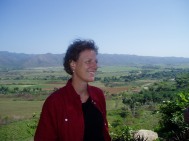October 28th, 12-2pm
AP246
After the land grab: Infrastructural violence and the mafia system in Indonesia’s oil palm plantation zone
Plantations are back. Colonial-style large scale corporate monoculture of industrial crops on concession land is again expanding in the global south. The biggest expansion is in Indonesia, where oil palm plantations already cover ten million hectares, and more are planned. The land dimensions of renewed plantation expansion were thrust into public debate in 2008-9, when there was a spike in transnational land-acquisitions dubbed a global “land-grab.” The polemical term “grab” usefully drew attention to what was being taken away: customary land rights, diverse farming systems, and ecological balance. Drawing on ethnographic research in the oil palm zone of West Kalimantan, Indonesia, this talk draws attention to what happens after the grab: to the social and political system that is put in place, together with the palms.
Plantations are industrial production machines. They are also machines for the production of predation, the violent underside of plantation life. Behind the plantations’ orderly, material grid of roads, palms, mills, and housing blocks; and behind its technical diagrams, accounts, contracts, and job descriptions, there is another system, an illicit double of the first. Locals call the double a “mafia system” but it is a system without a mafia. There is no controlling family, and no boundary separating members from non members. It is not the work of corrupt individuals who can be isolated and punished, nor of rogue companies that fail to obey the law. It is an extended, densely networked system in which everyone in an oil palm zone participates in order get somewhere, or simply to survive. It is too routine and patterned to be regarded as a failure or aberration of the plantation system. It is the system. It is entrenched as firmly as plantation roads, and parasitic on them: it makes use of the plantation’s material infrastructure to gain access to plantation wealth. It encodes rules of conduct that work around and through the plantation’s technical manuals, and mimic them. It is violent in the slow, unmarked way that all infrastructure is violent: because of the forms of life it destroys, the future it precludes, and the set of material, social and political relations it fixes in place.
Tania Murray Li teaches in the Department of Anthropology at the University of Toronto, where she holds the Canada Research Chair in the Political Economy and Culture of Asia. Her publications include Land’s End: Capitalist Relations on an Indigenous Frontier (Duke University Press, 2014), Powers of Exclusion: Land Dilemmas in Southeast Asia (with Derek Hall and Philip Hirsch, NUS Press, 2011), The Will to Improve: Governmentality, Development, and the Practice of Politics (Duke University Press, 2007) and many articles on land, development, resource struggles, community, class, and indigeneity with a particular focus on Indonesia.
Register here.
